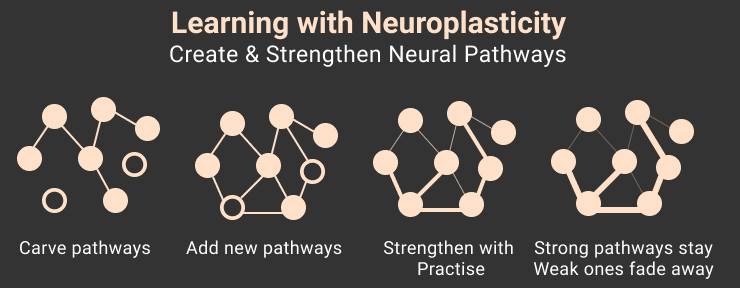Changing lifestyle habits by creating new neural pathways is rooted in neuroplasticity. Neuroplasticity is the brain’s ability to reorganise itself by forming new connections between neurons. This process enables individuals to replace old habits with healthier ones by rewiring their brains. Below is an explanation of how this transformation occurs.

- Habits are formed through a neurological process called the habit loop, which consists of three components: a cue, a routine, and a reward. The brain creates neural pathways that automate these loops to conserve energy. To change a habit, one must disrupt this loop by altering the cue or routine while maintaining the reward. For example, replacing junk food with healthy snacks while still enjoying a sense of satisfaction can help rewire these pathways.
- Repetition strengthens neural pathways, making behaviours automatic over time. New habits require consistent practice to establish these pathways. Research suggests it can take 3–6 months for a new behaviour to become ingrained, depending on individual differences. Repeatedly engaging in desired behaviours ensures the brain prioritises these pathways over old habits.
- Visualisation is a potent tool for forming new habits. When you imagine yourself successfully achieving your goals, you activate the same neural pathways as if you were acting. Adding emotional engagement to this process, such as excitement when visualising success in your fitness goals, can solidify these new pathways, inspiring and motivating you to continue your habit-changing journey.
- Your environment plays a pivotal role in triggering habits. By adjusting your surroundings to remove cues for unwanted behaviours, such as keeping unhealthy snacks out of sight, and introducing cues for desired ones, like placing a bowl of fresh fruits on your kitchen counter, you can take control of your habit change journey, which can help redirect your behaviour, empowering you to make positive changes.
- Exercise promotes neuroplasticity by increasing neurogenesis, the creation of new neurons, and enhancing neuronal signalling. Regular physical activity has been shown to improve cognitive function and support the development of new habits by strengthening the brain regions involved in self-control and decision-making.
- Nutrition significantly impacts neuroplasticity. Diets rich in omega-3 fatty acids, antioxidants, and essential nutrients like magnesium enhance brain function and support the formation of new neural connections. On the other hand, unhealthy diets high in sugar and saturated fats hinder this process.
- Remember that sleep is not a luxury but a critical component of your habit-changing journey. A good night’s sleep or short naps can enhance neuroplasticity by promoting dendritic spine growth and strengthening communication between neurons. Understanding the importance of rest can help you appreciate its crucial role in your habit formation process.
- Mindfulness practices, such as meditation, are invaluable tools in rewiring the brain by reducing stress and enhancing focus on present-moment awareness. These practices activate areas of the brain associated with self-regulation, making it easier to adopt healthier habits while weakening old ones. Their value in your habit-changing journey cannot be overstated.
- Positive reinforcement accelerates habit change by linking desired behaviours to rewards that trigger dopamine release in the brain’s reward system. For example, pairing healthy eating with enjoyable activities like listening to your favourite music can create positive associations with the new habit.
- Breaking existing habits requires confronting the beliefs and behaviours that sustain them, which involves intentionally disrupting old patterns and replacing them with new routines through conscious effort and self-reflection. Over time, as new behaviours are repeated, the old pathways weaken while the new ones become dominant.
By understanding how neuroplasticity works and applying strategies like repetition, visualisation, environmental modification, exercise, proper nutrition, sleep optimisation, mindfulness, and positive reinforcement, individuals can take control of their lives and successfully change their lifestyle habits. This understanding empowers them to create lasting behavioural transformations through newly formed neural pathways.
Tomorrow, I will debunk the theory that it takes 40 days to change a habit and give you the truth and an understanding of Neural Pathways.
